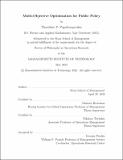Multi-Objective Optimization for Public Policy
Author(s)
Papalexopoulos, Theodore P.
DownloadThesis PDF (1.104Mb)
Advisor
Bertsimas, Dimitris
Trichakis, Nikolaos
Terms of use
Metadata
Show full item recordAbstract
Operations research has a storied history of tackling complex problems in public policy, ranging from vaccine distribution to the efficient design of public utility markets. The advent of "big data" analytics, machine learning, and scalable optimization has only expanded the field's impact, unlocking new research directions and application areas. What makes public policy a challenging domain is a combination of three factors: (i) policymakers must balance multiple objectives that often exist in tension, e.g., tradeoffs in efficiency and fairness; (ii) there are many stakeholders, with often disparate value judgments on how to best balance said objectives; and (iii) those stakeholders may not be technically fluent in analytics.
This thesis develops multi-objective optimization methodologies to support policymakers in designing more efficient, fair, and inclusive policies. We apply our techniques to a range of problems in transplantation policy and public education. A core theme of our work is the need for interpretable decision-support tools, e.g., interactive applications and tradeoff curves, which are crucial in translating abstract policy tradeoffs into actionable insights. Our goal is to provide stakeholders, even those without technical expertise, with an understanding of the range of achievable policy outcomes, so that they can more effectively engage in the policymaking process. We emphasize applications of our work to real-world problems, including an extensive collaboration with the United Network for Organ Sharing (UNOS) to help develop a new national lung allocation policy, which is slated for implementation in 2023.
Chapter 2 addresses a long-standing debate about geographic equity in organ allocation, by using multi-objective optimization to compare efficiency/fairness tradeoffs under different geographic distribution schemes. Chapter 3 introduces a novel optimization-based framework for "ethics-by-design" in scarce resource allocation, aiming to combine data modeling, shareholder input, and ethical theory into a unified approach for policy development in this area. Chapter 4 details our collaboration with UNOS policymakers to apply this framework towards the design of a new national lung allocation policy. Finally, Chapter 5 presents an empirical analysis of school assignment mechanisms for public school districts, investigating tradeoffs between satisfying student preferences and minimizing bus transportation costs.
Date issued
2022-05Department
Massachusetts Institute of Technology. Operations Research CenterPublisher
Massachusetts Institute of Technology